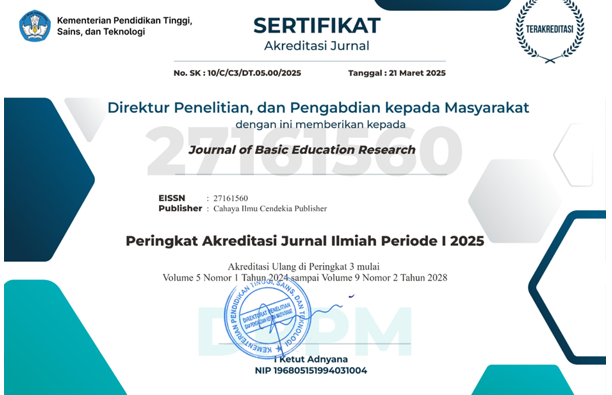The Effectiveness of the Traditional Congklak Game in Developing Fine Motor Skills in Early Childhood at the Kasih Bunda Kindergarten, South Aceh
Abstract
Purpose of the study: The primary objective of this research is to investigate the influence of the traditional game, Congklak, on the development of fine motor skills in early childhood at Kasih Bunda Kindergarten.
Methodology: This study employed an experimental research design with a pre-experimental approach. The participants consisted of students from the B2 group at Kasih Bunda Kindergarten, South Aceh, totaling 27 students in the experimental class. Data analysis was conducted using descriptive quantitative methods, comparing the averages of pre-test and post-test data collected through observations. Hypothesis testing was performed using the t-test based on the results of the activity scale.
Main Findings: The main finding of this research is the comparison of average values before and after the treatment. With tcount > ttable, specifically 27.30 > 2.056, the null hypothesis (Ho) is rejected, indicating a significant difference between the scores obtained from the initial and final tests at a 95% confidence level. Consequently, it can be concluded that the Congklak game significantly contributes to the development of fine motor skills in young children at Kasih Bunda Kindergarten.
Novelty/Originality of this study: The novelty of this research lies in the discovery of the potential of traditional games, such as Congklak, not merely as recreational activities but as effective tools for enhancing young children's fine motor skills, particularly in understanding number concepts and counting activities, thereby making classroom learning more engaging and enjoyable.
References
U. Kustiawan, R. D. T. Maningtyas, A. P. Putra, and A. Asmah, “Designing Clothing Patterns to Promote Fine Motor Skills: A Research and Development Project,” International Journal of the Whole Child, vol. 6, no. 2. pp. 9–18, 2021.
K. N. Hudson, H. M. Ballou, and M. T. Willoughby, “Short report: Improving motor competence skills in early childhood has corollary benefits for executive function and numeracy skills,” Dev. Sci., vol. 24, no. 4, pp. 1–9, Jul. 2021, doi: 10.1111/desc.13071.
E. Armstrong-Carter, M. J. Sulik, S. Siyal, A. K. Yousafzai, and J. Obradovi?, “Supplemental Material for Early and Concurrent Home Stimulation: Unique and Indirect Links With Fine Motor Skills Among 4-Year-Old Children in Rural Pakistan,” Dev. Psychol., vol. 57, no. 6, pp. 888–899, 2021, doi: 10.1037/dev0001185.supp.
D. Twigg, D. Pendergast, and J. Twigg, “Growing Global Citizens: Young Children’s Lived Experiences with the Development of Their Own Social World.,” Int. Res. Early Child. Educ., vol. 6, no. 1, pp. 79–91, 2015, [Online]. Available: www.education.monash.edu.au/irecejournal/
D. Gürel and T. Çetin, “A qualitative study on the opinions of 7th grade students on intangible cultural heritage,” Rev. Int. Geogr. Educ. Online, vol. 9, no. 1, pp. 32–62, 2019, doi: 10.33403/rigeo.573470.
L. M. Van Der Westhuizen and D. M. Hannaway, “Digital play for language development in the early grades,” South African J. Child. Educ., vol. 11, no. 1, pp. 1–8, 2021, doi: 10.4102/sajce.v11i1.925.
A. JUHÁSZ, “Primary school teachers’ attitude to board-games and their board-game playing practice,” Acta Didact. Napocensia, vol. 14, no. 1, pp. 182–187, 2021, doi: 10.24193/adn.14.1.15.
S. K. Saha and S. Singh, “Investigating the development of speaking skill through language games in technologically underequipped efl classroom,” Mextesol J., vol. 45, no. 3, pp. 0–2, 2021.
E. Roostin, S. Hartati, and Hapidin, “Policy Analysis of Sumedang Regency as Center for Sundanese Culture in Congklak Traditional Games,” Scientia, vol. 2, no. 2, pp. 12–16, 2023, doi: 10.51773/sssh.v2i2.223.
J. Yap and J. Peñaflor, “The amazing library race: developing students’ media and information literacy skills through games,” J. Inf. Lit., vol. 14, no. 1, pp. 66–82, 2020, doi: 10.11645/14.1.2708.
M. Ö. Selçuk, M. Emmanouil, M. Grizioti, and L. VAN LANGENHOVE, “Game Modding for Learning Design Thinking on an E-Learning Platform,” Des. Learn., vol. 14, no. 1, pp. 99–111, 2022, doi: 10.16993/dfl.181.
D. N. Nasution, D. Saragi, and Y. Ndona, “Penanaman Nilai-Nilai Karakter Terhadap Peserta Didik Sekolah Dasar Melalui Permainan Tradisional Congklak Atau Lumbung,” J. Motiv. Pendidik. dan Bhs., vol. 1, no. 4, pp. 92–98, 2023, doi: 10.59581/jmpb-widyakarya.v1i4.1940.
S. Suhaebah, “Traditional game as a social studies learning method to develop student’s communication and collaborative skills,” Present. Dur. 4th Int. Semin. Soc. Stud. Hist. Educ., pp. 340–350, 2019, [Online]. Available: http://repository.upi.edu/47321/27/SPS_PRO_PIPS_ISSSHE_2019_Siti Suhaebah.pdf
M. Willoughby, K. Hudson, Y. Hong, and A. Wylie, “Improvements in Motor Competence Skills Are Associated With Improvements in Executive Function and Math Problem-Solving Skills in Early Childhood,” Dev. Psychol., vol. 57, no. 9, pp. 1463–1470, 2021, doi: 10.1037/dev0001223.
S. Bilal Ahmad Gul, “Early Childhood Care and Education (3-6 Years) and the Role of Traditional Games: An Exploratory Study of Jammu and Kashmir,” Asian J. Educ. Soc. Stud., vol. 39, no. 1, pp. 53–59, 2023, doi: 10.9734/ajess/2023/v39i1839.
K. Tchilaia, “Morphosyntactic Peculiarities of The Speech of Children with Down ’ s Syndrome,” Int. Conf. Stud. Educ. Soc. Sci., pp. 467–478, 2022.
U. Yunus, B. P. Wahyuningtyas, and M. N. Willyarto, “Branding about Indonesia through cross-cultural communication,” J. Stud. Komun. (Indonesian J. Commun. Stud., vol. 4, no. 2, p. 374, 2020, doi: 10.25139/jsk.v4i2.2412.
A. Jabar, R. Y. Gazali, A. A. Ningrum, M. F. Atsnan, and R. C. I. Prahmana, “Ethnomathematical Exploration on Traditional Game Bahasinan in Gunung Makmur Village the Regency of Tanah Laut,” Math. Teaching-Research J., vol. 14, no. 5, pp. 107–127, 2022.
Y. Yantoro, D. A. Kurniawan, and N. Silvia, “Implementation of the Congklak Traditional Game in Madrasah Ibtidaiyah and Elementary School,” J. Pendidik. Agama Islam, vol. 18, no. 2, pp. 407–430, 2021, doi: 10.14421/jpai.2021.182-11.
P. V. Asteria, A. Rofiuddin, I. Suyitno, and G. Susanto, “Indonesian-based Pluricultural Competence in BIPA Teachers’ Perspective,” Eurasian J. Appl. Linguist., vol. 9, no. 1, pp. 190–201, 2023, doi: 10.32601/ejal.901016.
L. M. Fauzi, F. Hanum, J. Jailani, and J. Jatmiko, “Ethnomathematics: Mathematical ideas and educational values on the architecture of Sasak traditional residence,” Int. J. Eval. Res. Educ., vol. 11, no. 1, pp. 250–259, 2022, doi: 10.11591/ijere.v11i1.21775.
M. Rahmah Dewi, “Educative Game Tools Based On Environmental Materials In Over-coming Learning Problems Early Childhood Education Programs,” Eduvest - J. Univers. Stud., vol. 3, no. 1, pp. 302–308, 2023, doi: 10.59188/eduvest.v3i1.740.
D. Susilowati, S. Sugiyo, and J. Sutarto, “The effectiveness of learning dolanan song and traditional Javanese games on early childhood character development,” J. Prim. Educ., vol. 10, no. 2, pp. 151–162, 2021, [Online]. Available: https://journal.unnes.ac.id/sju/index.php/jpe/article/view/47566
S. Muthomimah, F. Hanurawan, N. Eva, and H. Rahmawati, “Pancasila Educational Games with Zone Proximal Development: An Analysis of Human-Computer Interaction Perception Based on Technology Acceptance Model,” Pegem J. Educ. Instr., vol. 13, no. 4, pp. 126–135, 2023, doi: 10.47750/pegegog.13.04.15.
Y. V. Wote, A. Sasingan, M. Kasiang, and Yunita, “Meningkatkan Kemampuan Berhitung Melalui Media Congklak Pada Siswa Kelas II SD Inpres Wosia,” Int. J. Elem. Educ., vol. 4, no. 1, pp. 107–111, 2020, [Online]. Available: https://ejournal.undiksha.ac.id/index.php/IJEE
Syahrial, Asrial, D. A. Kurniawan, N. D. Kiska, and L. Damayanti, “Teaching Primary School Students through Local Cultural Games for Improving Positive Characters,” Int. J. Instr., vol. 15, no. 3, pp. 1047–1078, Jul. 2022, doi: 10.29333/iji.2022.15356a.
W. C. Cheung, H. Meadan, and S. Shen, “Motor, Cognitive, and Socioemotional Skills Among Children With Disabilities Over Time,” J. Spec. Educ., vol. 55, no. 2, pp. 79–89, 2021, doi: 10.1177/0022466920940800.
G. Frolek Clark and G. Luze, “Predicting Handwriting Performance in Kindergarteners Using Reading, Fine-Motor, and Visual-Motor Measures,” J. Occup. Ther. Sch. Early Interv., vol. 7, no. 1, pp. 29–44, 2014, doi: 10.1080/19411243.2014.898470.
T. Matarma et al., “Motor skills in association with physical activity, sedentary time, body fat, and day care attendance in 5-6-year-old children—The STEPS Study,” Scand. J. Med. Sci. Sport., vol. 28, no. 12, pp. 2668–2676, 2018, doi: 10.1111/sms.13264.
Hidayatullah, S. Hidayat, U. Jamaludin, S. M. Leksono, and A. G. Prawiyogi, “Realizing The Profile of Pancasila Students through Bebentengan Traditional Games in Elementary School Students,” PrimaryEdu J. Elem. Educ., vol. 7, no. 2, pp. 278–291, 2023, doi: https://doi.org/10.22460/pej.v7i2.3899.
E. Saneleuterio, R. López-García-torres, and T. Fernández-Ulloa, “Forestalling Bullying in Primary and Secondary Schools in Spain,” Athens J. Educ., vol. 10, no. 1, pp. 9–26, 2023, doi: 10.30958/aje.10-1-1.
M. ÖNDER, “Contribution of Plays and Toys to Children’s Value Education,” Asian J. Educ. Train., vol. 4, no. 3, pp. 146–149, 2018, doi: 10.20448/journal.522.2018.42.146.149.
Arikunto, Prosedur Penelitian Suatu Pendekatan Praktek. Jakarta: PT. Rineka Cipta, 2006.
Sugiyono, Metode Penelitian pendidikan. Bandung: Alfabeta, 2015.
Trianto, Model Pembelajaran Terpadu, Konsep, Strategi dan Implementasinya dalam KTSP. Jakarta: Bumi Aksara, 2010.
Kamid, R. K. Dewi, D. A. Kurniawan, M. Z. Azzahra, and A. M. Nawahdani, “Student Learning Difficulties in Terms of the STIF in Framework of Fractional Material,” J. Penelit. dan Pengemb. Pendidik., vol. 7, no. 2, pp. 187–194, 2023, doi: 10.23887/jppp.v7i2.57371.
H. Sabil, D. A. Kurniawan, R. Perdana, M. Nawahdani, and B. Widodi, “Students ’ Learning Interest Using Web-Based Assessment at The Elementary School Level,” vol. 7, no. 4, pp. 632–640, 2023.
Suharsimi and Arikunto, Prosedur penelitian suatu pendekatan pratek. Yogyakarta: Rineka Cipta, 2010.
W. K. Adams and C. E. Wieman, “Development and validation of instruments to measure learning of expert-like thinking,” Int. J. Sci. Educ., vol. 33, no. 9, pp. 1289–1312, 2011, doi: 10.1080/09500693.2010.512369.
Mukhlis, “Pembelajaran Matematika Realistik untuk materi pokok kelas VII SMPN Pailangga,” Universitas Negeri Surabaya, Surabaya, 2015.
Anas Sudijono, Pengantar evaluasi pendidikan. Jakarta: Raja Grafindo, 2009.
M. R. Lindegaard and W. Bernasco, “Lessons Learned from Crime Caught on Camera,” J. Res. Crime Delinq., vol. 55, no. 1, pp. 155–186, 2018, doi: 10.1177/0022427817727830.
Syamsuddin, Metode Penelitian Pendidikan Bahasa. Bandung: Remaja Rosdakarya , 2011.
H. Mohajan, Munich Personal RePEc Archive Quantitative Research: A Successful Investigation in Natural and Social Sciences, vol. 9, no. 4. 2020. [Online]. Available: https://mpra.ub.uni-muenchen.de/105149/
Supardi, Aplikasi Statistika dalam Penelitian Konsep Statistika yang Lebih Komprehensif. Jakarta: Change Publication, 2013.
S. Rincón-Gallardo and M. Fullan, “Essential features of effective networks in education,” J. Prof. Cap. Community, vol. 1, no. 1, pp. 5–22, 2016, doi: 10.1108/JPCC-09-2015-0007.
M. D. Pitoyo, Sumardi, and A. Asib, “Gamification-based assessment: The washback effect of quizizz on students’ learning in higher education,” Int. J. Lang. Educ., vol. 4, no. 1, pp. 1–10, 2020, doi: 10.26858/ijole.v4i2.8188.
B. N. Astini, I. Rachmayani, N. Nurhasanah, and N. L. T. P. Wijaya, “Identification of traditional science-based games to improve early childhood development in Central Lombok District,” J. Pijar Mipa, vol. 18, no. 1, pp. 42–49, 2023, doi: 10.29303/jpm.v18i1.3919.
E. Erlangga and Haryanti, “The Effect of Traditional Games on Early Childhood Cognitive Development,” J. Educ. Soc. Issues, vol. 2, no. 1, pp. 1–18, 2022, doi: 10.26623/jesi.v2i1.36.
P. N. Widiasavitri, N. M. Y. A. Agustini, D. P. Astiti, L. M. K. S. Suarya, and T. Haryati, “Traditional Games as Alternative Activities for Children Stimulation,” J. Psychol. Instr., vol. 4, no. 1, pp. 1–9, 2020, doi: 10.23887/jpai.v4i1.23010.
Copyright (c) 2023 Erlina Erlina, Emi Mastura, Lilian A. Herrera, Muhammad Asyraf Norli

This work is licensed under a Creative Commons Attribution 4.0 International License.
Authors who publish with this journal agree to the following terms:
- Authors retain copyright and acknowledge that the Journal of Basic Education Research is the first publisher licensed under a Creative Commons Attribution 4.0 International License.
- Authors are able to enter into separate, additional contractual arrangements for the non-exclusive distribution of the journal's published version of the work (e.g., post it to an institutional repository or publish it in a book), with an acknowledgment of its initial publication in this journal.
- Authors are permitted and encouraged to post their work online (e.g., in institutional repositories or on their website) prior to and during the submission process, as it can lead to productive exchanges and earlier and greater citation of published work.





.png)


.png)
.png)


















